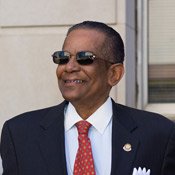Also see: Full JFP Melton Blog/Archive/Trial
A federal judge will hear arguments today on whether to hold separate trials for Mayor Frank Melton and his former police bodyguard Michael Recio. Melton and Recio are under federal indictment for civil-rights violations in conjunction with the 2006 destruction of a Ridgeway Street duplex. They beat different state charges for the incident in 2007, and their first federal trial ended in a hung jury Feb. 24. Their re-trial will begin May 11.
Recio's attorney Cynthia Stewart has made multiple requests to sever her client's trial from the mayor's, arguing that Melton would testify in Recio's defense only in a separate trial. Neither defendant testified in the first federal trial. Judge Dan Jordan denied Stewart's earlier requests in written orders, but he granted a hearing on the matter after Stewart's most recent request, filed April 3.
Melton and Recio originally faced a third gun charge, but federal prosecutor Mark Blumberg indicated last month that the government would drop the third charge. All witnesses in the first federal trial testified that Melton's other former bodyguard Marcus Wright, who accepted a plea deal with the government, was the only person carrying a gun during the raid. As part of a flurry of motions filed Monday, prosecutors formally asked Jordan to dismiss the gun charge.
Prosecutors also made two requests to limit the arguments that defense attorneys can make in the re-trial. One motion asks Jordan to exclude evidence of duplex tenant Evans Welch's arrest in the raid's aftermath.
"The trial record clearly reveals that defense counsel used evidence of Welch's arrest, the crackpipes and pushrod found on him, and his booking photo specifically for nullification purposes, attempting to convince the jury that the victim in this case was a drug user … and that Welch and the house were therefore undeserving of constitutional protection," prosecutors wrote.
The motion relies in part on prosecutors' frequent argument that evidence of drug use is irrelevant to the case and would appeal to jurors "passions," rather than their understanding of the law. Melton and Recio did not find out about Welch's outstanding warrants or discover drug paraphernalia until after the duplex was destroyed, prosecutors point out.
The motion also reveals a previously unavailable account of a bench conference between attorneys during the first federal trial. In a conversation that jurors did not hear, Melton's attorney, John Reeves asked Jordan to admit a black-and-white booking photo of Welch because it looked "worse" than the color version already admitted. Prosecutors claim that Reeves' word choice shows his intention to "frighten" jurors into believing that Welch was "a scary, dangerous-looking drug-user," undeserving of his Fourth Amendment rights.
A second government motion asks Judge Jordan to exclude several arguments made by defense attorneys during the first trial that prosecutors consider "improper." Prosecutors want to prohibit Reeves from suggesting that duplex owner Jennifer Sutton is testifying to support her civil lawsuits against Melton and the city. Reeves made repeated references in his closing argument to Sutton wanting the "taxpayers' money," which prosecutors called "blatant appeal[s] to the jurors' self-interest."
Another of Reeves' arguments that prosecutors want to see excluded centers on the government's cooperating witnesses. Reeves implied in his closing argument that jurors should acquit Melton because the government did not prosecute Marcus Wright and Michael Taylor, who also participated in the raid.
"What's right about letting Taylor go with no punishment and then letting Wright off the hook with a misdemeanor? But they want you to convict these defendants of felonies," Reeves told jurors.
"Government counsel objected to this improper argument, and the Court sustained the objection, but the harm had already been done," prosecutors wrote in their motion.
The government also wants to preemptively exclude Reeves' argument that the Ridgeway incident should be settled with a civil case. During the first federal trial, Jordan twice sustained the governments' objections when Reeves made that suggestion.
"Defense counsel therefore should be firmly ordered before the re-trial not to raise this argument again at any time during the re-trial," prosecutors argued.
Prosecutors asked Jordan to exclude the argument made by Recio's attorney Cynthia Stewart that jurors should acquit the mayoral bodyguard because he was following orders. Recio was clearly aware that the demolition was illegal, prosecutors argue, which makes following orders an invalid defense.
Yet another government motion indicated that prosecutors hope to reference Marcus Wright's guilty plea during their opening statement for the re-trial. Prosecutor Patricia Sumner did not mention Wright's plea deal during her opening in the first federal trial, and both defense attorneys hammered on the point to raise doubts about Wright's testimony. The government motion requests permission to refer to the plea, noting that Wright's testimony will be "enthusiastically impeached" by the defense.



Comments
Use the comment form below to begin a discussion about this content.
comments powered by Disqus